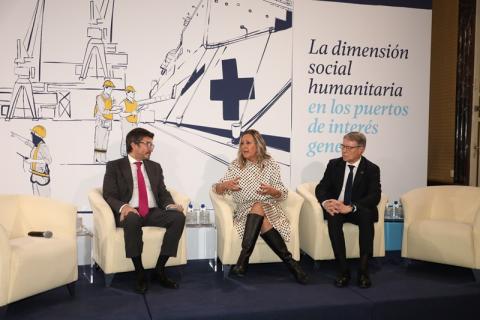
Puertos del Estado promotes the social and humanitarian sustainability of Spanish ports
- “Ports exist by and for people, as reflected in the Strategic Framework, which balances social and economic dimensions,” emphasized the agency’s president, Álvaro Rodríguez Dapena
- The event showcased initiatives such as Seafarer Welfare Committees, contributions from cruise ships to food banks, and hospital ships
19-11-2024 (Organismo Público Puertos del Estado). “The Strategic Framework of the state-owned port system places the social and humanitarian dimension of ports on the same level as the economic one. This is resonating across management tools and regulations because we must return to the origins of ports as places of refuge, focusing on people and working for them,” stated Álvaro Rodríguez Dapena, President of Puertos del Estado, during the opening of the event “The Social and Humanitarian Dimension of General Interest Ports,” held today in Madrid. “Ports belong to no one and to everyone; they are ports by and for people,” he added.
Benito Núñez, Secretary General for Maritime and Air Transport, drew attention to the situation of seafarers, “the most vulnerable human link in maritime trade.” He added, “We need to raise awareness of the working conditions that keep maritime trade operational and work together to improve them.”
During the event, efforts were made to strengthen Seafarer Welfare Committees across all general interest ports. Initiatives were presented by: Carlos Botana, President of the Vigo Port Authority; Francesc Bonada, Head of Organization and Sustainability at the Barcelona Port Authority; Raúl López Marrero, Quality Systems Manager at the Las Palmas Port Authority; Nuria Obiols, Director of Port Operations at the Tarragona Port Authority. All speakers highlighted the importance of supporting seafarers onshore at all levels and establishing stable funding mechanisms for these activities, an ongoing effort within the National Committee.
Paco Prado, President of Aportem-Puerto Solidario Valencia, showcased the support provided by this association to the most vulnerable populations in port areas, currently focusing on helping those affected by recent storms. He stressed the importance of “trust, organization, and good management to achieve effective humanitarian assistance.”
Another initiative presented was the contribution of cruise ships to food banks. Costa Cruises has launched this effort in the ports of Barcelona, Valencia, and Palma de Mallorca, with the support of Puertos del Estado and External Health. “Food that has been cooked but not served in the ship’s restaurants is stored in special containers under proper sanitary controls and conditions, and donated to food banks for distribution to beneficiaries,” explained Rafael Fernández Álava, Communication Director at Costa Cruises. Ana María Sanz Fernández, Head of International Goods Control at the Ministry of Health, added, “External Health ensures that the food is safe for consumption.” According to Lluis Costa, Head of Distribution at the Barcelona Food Bank, the initiative has been well-received, “We receive about 1,000 meals per month that go directly to families and communities in need. This equates to 12,000 meals annually, with the operational capacity to do much more.”
The event also featured discussions on medical care and training provided by hospital ships. Elena Martínez Carqués, Director of the Maritime Social Institute, detailed the medical assistance offered to Spanish seafarers at sea, delivered through two support vessels equipped with all necessary services, a pioneering effort in Europe. Gerardo Vangioni, President of Mercy Ships Spain, described the organization’s work as “using hospital ships to bring health and hope to those in need.” To date, Mercy Ships has assisted over three million people and trained more than 54,000 professionals. “Our work would not be possible without the support of Spanish ports, where ship maintenance, provisioning, and crew rest are made possible,” Vangioni concluded.

